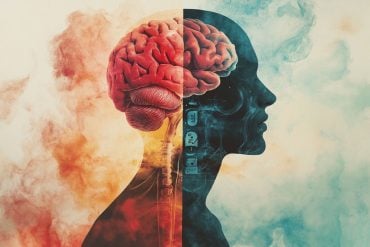Summary: A study recently published in Clinical Psychology Review investigates time perception and temporal information processing in people with schizophrenia. The study reveals the internal clock in schizophrenics does not necessarily run slower or faster than in healthy individuals, but rather it does not run at a consistent speed.
Source: University of Mainz.
Persons suffering from schizophrenia have a different perception of time than healthy individuals. There is far more variation in the way that a time interval is perceived by people with schizophrenic disorders than by those who do not have the condition. Patients with schizophrenia are also less precise when it comes to judging the temporal order of events. These are the conclusions drawn from the results of a meta-analysis undertaken by psychologists at Johannes Gutenberg University Mainz (JGU), for which they evaluated 68 international publications from the past 65 years and compared the data of 957 schizophrenia patients with that of 1,060 healthy control persons.
Although the clinical syndrome known as schizophrenia is already widely recognized, the connection between the cognitive and neurological impairments on the one hand and the patient’s symptoms on the other remains unclear. One theory that is current among schizophrenia researchers is that errors in temporal information processing could underlie the disorder and give rise to the known symptoms, such as the hallucinations experienced by patients who might, for instance hear voices, and the disconnection between actions and thoughts. In their meta-analysis, psychologists Sven Thönes, at present a researcher at the Leibniz Research Center for Working Environment and Human Factors in Dortmund, and Dr. Daniel Oberfeld-Twistel of the Department of Psychology at Mainz University investigated whether there was evidence in support of the hypothesis that there is disruption of time perception and temporal processing in schizophrenia patients.
For the purposes of the meta-analysis undertaken in Mainz, the factor of ‘time perception’ was assessed on the basis on how subjects judged the duration of a particular time interval. For instance, subjects were asked to estimate the number of seconds a square was visible on a computer screen. ‘Temporal processing’ on the other hand, was evaluated in terms of a perceived sequence of events; so, for example, subjects were asked to report whether a blue square was displayed prior to a red square or vice versa.
Internal clock ticks irregularly
According to the results of this psychological study, the precision with which people with schizophrenia can perceive time and process temporal sequences is seriously impaired. In other words, their evaluations of time-related aspects were much more variable in comparison with those of the control group of healthy subjects. When, for example, subjects were asked 20 times in succession to estimate the duration for which a square — displayed for exactly one second in each case — appeared on the screen, the estimates given by patients with schizophrenia exhibited a much higher level of variability than those of the control group. However, the mean value, i.e., the average duration estimate in seconds, was the same in both groups.

These results show that the internal clock in patients suffering from schizophrenia does not necessarily run faster or slower than that in healthy individuals, but rather that it does not run at a constant speed. Thönes and Oberfeld-Twistel conclude that the clock ticks irregularly. Concerning the problems when it comes to perceiving chronological sequences, these could also be caused by fundamental cognitive deficits in patients with schizophrenia and may not be related to the general way they perceive time. “The assumption nowadays is that schizophrenia disrupts processing operations so that the transfer of information in the brain is slightly out of rhythm,” explained Oberfeld-Twistel. This might be the reason why there is a failure to correctly recognize simple chronological sequences.
The meta-analysis has also shown that certain factors, among them the potential influence of medications and neurotransmitters, have not as yet been adequately researched and need to be addressed in future research projects.
Source: Daniel Oberfeld-Twistel – University of Mainz
Image Source: NeuroscienceNews.com image is in the public domain.
Original Research: Abstract for “Meta-analysis of time perception and temporal processing in schizophrenia: Differential effects on precision and accuracy” by Sven Thoenesa and Daniel Oberfelda in Clinical Psychology Review. Published online March 29 2017 doi:10.1016/j.cpr.2017.03.007
[cbtabs][cbtab title=”MLA”]University of Mainz “Erratic Time Perception in Schizophrenia.” NeuroscienceNews. NeuroscienceNews, 12 July 2017.
<https://neurosciencenews.com/time-perception-schizophrenia-7066/>.[/cbtab][cbtab title=”APA”]University of Mainz (2017, July 12). Erratic Time Perception in Schizophrenia. NeuroscienceNew. Retrieved July 12, 2017 from https://neurosciencenews.com/time-perception-schizophrenia-7066/[/cbtab][cbtab title=”Chicago”]University of Mainz “Erratic Time Perception in Schizophrenia.” https://neurosciencenews.com/time-perception-schizophrenia-7066/ (accessed July 12, 2017).[/cbtab][/cbtabs]
Abstract
Meta-analysis of time perception and temporal processing in schizophrenia: Differential effects on precision and accuracy
Numerous studies have reported that time perception and temporal processing are impaired in schizophrenia. In a meta-analytical review, we differentiate between time perception (judgments of time intervals) and basic temporal processing (e.g., judgments of temporal order) as well as between effects on accuracy (deviation of estimates from the veridical value) and precision (variability of judgments). In a meta-regression approach, we also included the specific tasks and the different time interval ranges as covariates. We considered 68 publications of the past 65 years, and meta-analyzed data from 957 patients with schizophrenia and 1060 healthy control participants. Independent of tasks and interval durations, our results demonstrate that time perception and basic temporal processing are less precise (more variable) in patients (Hedges’ g > 1.00), whereas effects of schizophrenia on accuracy of time perception are rather small and task-dependent. Our review also shows that several aspects, e.g., potential influences of medication, have not yet been investigated in sufficient detail. In conclusion, the results are in accordance with theoretical assumptions and the notion of a more variable internal clock in patients with schizophrenia, but not with a strong effect of schizophrenia on clock speed. The impairment of temporal precision, however, may also be clock-unspecific as part of a general cognitive deficiency in schizophrenia.
“Meta-analysis of time perception and temporal processing in schizophrenia: Differential effects on precision and accuracy” by Sven Thoenesa and Daniel Oberfelda in Clinical Psychology Review. Published online March 29 2017 doi:10.1016/j.cpr.2017.03.007






